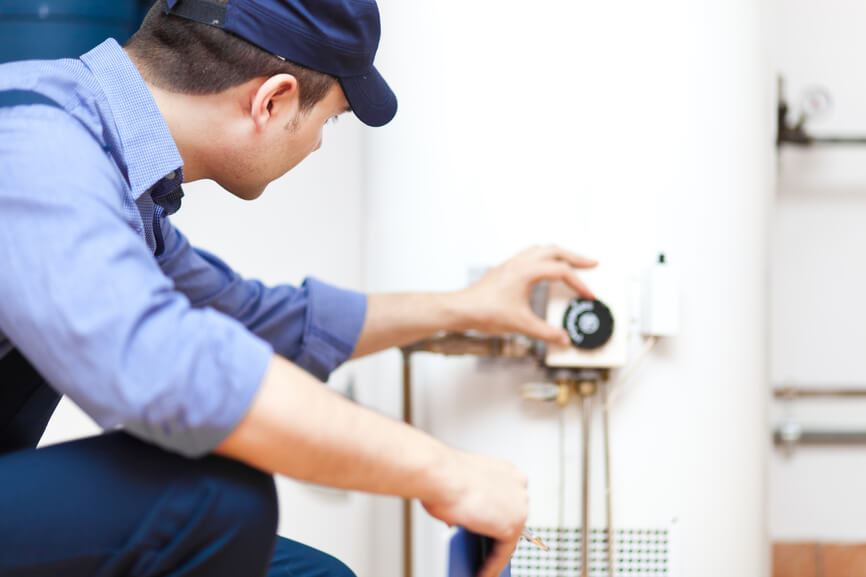In the life cycle of a household, the moment arrives when an important decision looms: replacing your water heater. This is not a decision to be taken lightly, as your water heater is a silent yet crucial backbone of daily comfort and convenience. Understanding when to replace it is essential for maintaining not just warm showers but also the efficiency and safety of your home.
This comprehensive guide explores subtle signs and essential considerations when it comes to replacing your water heater. It’s crafted to navigate you through the varied landscape of options, helping you make an informed choice that aligns with your household’s specific needs. From recognizing the nuanced signals of a failing unit to exploring the latest in water heating technology, we’ll illuminate the path to a decision that ensures you continue to enjoy uninterrupted access to hot water in your home.
Deciding on the Ideal Time for a Water Heater Upgrade
Embarking on the journey of replacing your water heater involves more than just reacting to a total breakdown. It’s about astutely noticing the subtle and often overlooked cues that suggest your current system is no longer up to par. Let’s dive into a nuanced exploration of those key indicators that whisper, rather than shout, that the time for a new water heater has arrived.
Gauging the Timeline of Technology
A pivotal aspect to consider is the chronological age of your water heater. Standard tank heaters typically promise a functional life of around 8-12 years. When your unit crosses this threshold, it’s prudent to begin contemplating a transition. Aging units, despite their operational status, tend to lag in efficiency and are more prone to unexpected failures.
Temperature Inconsistencies: More Than Just a Nuisance
If you’re experiencing a rollercoaster of water temperatures or a noticeable decline in heating capacity, it’s a telltale sign of internal degradation or sediment accumulation. These temperature variances are more than mere inconveniences; they signify a struggling system.
Repair Recurrences: A Financial Red Flag
Monitor the frequency of repairs needed for your unit. A pattern of recurring issues is not just a hassle but also a financial red flag. This pattern suggests that your water heater is inching towards obsolescence.
The Silent Indicator: Soaring Energy Costs
An unnoticed yet significant indicator is a gradual increase in energy bills. This uptick can signify that your water heater is exerting extra effort, and hence more energy, to perform its basic function. Transitioning to a newer, energy-efficient model can be a cost-saving and environmentally sound decision.
Auditory Alarms: The Sounds of Aging
Paying attention to your water heater’s sounds can be enlightening. Noises like rumbling or crackling are symptomatic of sediment buildup, a common aging issue that can reduce both efficiency and lifespan.
Clarity of Water: A Window into Tank Health
The condition of the water heated can reveal much about the health of your tank. Rusty or murky water often points to internal corrosion, a serious issue that typically necessitates a complete replacement.
Visual Clues: Leaks and Corrosion
Regular inspections of your water heater can uncover critical visual clues. Leakage or external rusting are not only immediate concerns but also indicators of potential tank failure.
Reassessing Capacity Needs
Lastly, consider if your water heater still aligns with your household’s hot water needs. Changes in family size or lifestyle can mean your current heater is either too large, leading to wasteful energy expenditure, or too small, resulting in a constant shortage of hot water.
Identifying these nuanced indicators will empower you to make a well-informed decision regarding upgrading your water heater. It’s a proactive approach, focusing not just on resolving current inefficiencies but also on optimizing future water heating performance and comfort in your home.
Types of Water Heaters and Their Pros and Cons
Choosing the right water heater involves understanding the different types available and evaluating their advantages and limitations. Here’s a detailed look at each type, followed by an analysis of their pros and cons, to guide you in making a well-informed decision for your home.
Traditional Storage Tank Water Heaters
The prevalent type of water heater found in homes is the traditional storage tank water heater, characterized by an insulated tank where water is heated and stored until required. These heaters have a temperature and pressure-release valve that opens if either exceeds a preset level.
Pros:
- Familiarity and Ease of Use: Widely used, making them familiar to most homeowners. Installation and operation are uncomplicated.
- Lower Initial Cost: They typically come with a more budget-friendly initial purchase price.
- Reliable Performance: Provides a dependable supply of hot water, suitable for high-demand households.
Cons:
- Higher Operational Costs: Continuously heats water, leading to more energy usage.
- Bulky Size: Necessitates a substantial amount of space, which can pose a constraint in smaller homes.
- Shorter Lifespan: Typically, they last between 10-15 years, which is shorter than some modern alternatives.
Tankless Water Heaters (On-Demand)
Tankless water heaters, also referred to as on-demand water heaters, supply hot water only when it is required. They don’t store hot water, instead, water is heated rapidly as it passes through the unit.
Pros:
- Energy Efficiency: Significant savings on energy bills as it heats water only on demand.
- Longer Lifespan: Can have a lifespan of up to 20 years, surpassing the longevity of traditional tank heaters.
- Space-Saving Design: Their compact size frees up valuable space in the home.
Cons:
- Higher Initial Cost: The purchase and installation costs are typically higher.
- Limited Output: May not be able to handle simultaneous demands for hot water in larger households.
- Complex Installation: Professional installation is crucial, especially for models that require gas lines.
Hybrid Heat Pump Water Heaters
Hybrid heat pump water heaters utilize ambient heat from the air or ground to heat water, blending traditional water heating with the efficiency of a heat pump.
Pros:
- Exceptional Energy Efficiency: One of the most efficient water heater types available.
- Eco-Friendly: Lowers carbon footprint by using renewable energy sources.
- Cost Savings Over Time: The operational costs can be significantly lower than traditional models.
Cons:
- Higher Purchase Price: More expensive to buy than conventional water heaters.
- Climate Dependencies: Performance is optimal in certain environmental conditions.
- Space Requirements: Needs enough space for proper air circulation, limiting its placement options.
Solar Water Heaters
Solar water heaters harness the sun’s energy to heat water, employing solar panels mounted on the roof in conjunction with a storage tank.
Pros:
- Renewable Energy Utilization: Harnesses solar energy, making it a green choice.
- Significant Reduction in Energy Bills: Especially effective in sunny climates.
- Government Incentives: Often eligible for tax rebates and incentives.
Cons:
- High Initial Investment: The cost of installation and the solar panels can be substantial.
- Weather Dependent: Their efficiency can decrease in less sunny conditions.
- Need for Backup System: Typically requires a secondary system for consistent hot water supply.
Condensing Water Heaters
Ideal for homes using natural gas, condensing water heaters utilize gas exhaust, which would otherwise be wasted, to heat water. They prove to be an efficient choice for households with substantial hot water demands.
Pros:
- High Efficiency for Gas Users: Excellent choice for homes with significant natural gas usage.
- Environmentally Friendly: Reduces greenhouse gas emissions.
- Effective Energy Use: Capitalizes on otherwise wasted gas exhaust for heating.
Cons:
- Higher Purchase Price: More expensive upfront than traditional gas water heaters.
- Complex Installation Requirements: Professional installation is necessary, with specific venting needs.
- Limited to Gas Supply: Exclusive suitability for homes with an existing natural gas line.
Every type of water heater comes with its distinct features and considerations. Assessing these pros and cons in alignment with your household requirements, available space, budget, and environmental preferences will assist you in selecting the most fitting water heater for your home.
Factors to Consider Before Replacement
Having explored the various types of water heaters and their respective pros and cons, it’s essential to consider several key factors before proceeding with a replacement. This segment will lead you through crucial considerations to guarantee that your choice aligns perfectly with your specific requirements and home setup.
Assessing Your Household’s Hot Water Demand
Recognizing your household’s hot water usage is crucial. Reflect on the number of people in your home, daily routines, and peak usage times. This evaluation will assist in determining the capacity and type of water heater that best suits your needs, preventing shortages or overspending on an excessively large unit.
Energy Source and Efficiency
The energy source for your water heater (gas, electricity, solar, etc.) impacts both operational costs and installation requirements. Evaluate the availability and cost of these energy sources in your area. Additionally, consider the energy efficiency of the unit you’re interested in, as this will affect your long-term energy expenses.
Space and Installation Constraints
The space available for your water heater can limit your options. Tankless and hybrid models may offer space-saving benefits but come with specific installation needs. Ensure that the model you choose can be accommodated in your designated space and that your home can support its installation requirements.
Budget and Long-Term Costs
While the initial purchase price is a significant factor, also take into account the long-term operational costs. More efficient models might have a higher upfront cost but can provide savings in the long run through reduced energy bills. Strike a balance between your upfront budget and potential future savings.
Compatibility with Your Home’s Infrastructure
Take into account the compatibility of the new water heater with your current plumbing and electrical systems. Certain models may necessitate substantial alterations or upgrades to your home’s infrastructure, contributing to the overall cost and complexity of the installation.
Future Needs and Scalability
Think about your future needs. If you foresee adjustments in your household size or hot water needs, select a model that allows for scalability. Investing in a versatile system at present can prevent the need for another replacement in the near future.
Environmental Impact
For environmentally conscious homeowners, the ecological footprint of the water heater is an important consideration. Options like solar or hybrid heat pump water heaters can be more eco-friendly, reducing your overall carbon footprint.
By carefully weighing these factors, you can make a more informed and suitable choice for your water heater replacement, ensuring it meets your current needs and remains a viable solution for years to come.
The Replacement Process: What to Expect
Having considered the essential factors before opting for a water heater replacement, it’s important to know what the replacement process entails. This understanding will prepare you for what to expect, ensuring a smooth transition to your new water heater.
Selecting the Right Water Heater
Armed with knowledge about your household’s needs, energy preferences, and space constraints, the first step is selecting the appropriate water heater. This involves choosing a model that balances efficiency, capacity, and budget. It is recommended to compare various models and seek professional advice to identify the optimal fit for your specific situation.
Professional Consultation and Quotation
Once you’ve narrowed down your choices, consulting with a professional is a wise move. They can provide a detailed quotation, considering not just the cost of the water heater but also installation and any necessary modifications to your home infrastructure.
Preparing for Installation
Before the installation day, there might be preparatory work needed in your home, especially if you are switching to a different type of water heater or if the new model has different space or utility requirements. This could include adjustments in plumbing, electrical wiring, or even creating space for the unit.
Installation Day
On the day of installation, the process typically involves removing the old unit, making necessary adjustments to fit the new one, and setting up connections to your home’s water, gas, or electrical lines. This procedure may take several hours and will likely necessitate temporarily shutting off water and power.
Testing and Final Adjustments
Following installation, the professional will conduct tests on the water heater to ensure its correct functionality. This involves checking for leaks, confirming appropriate temperature settings, and ensuring efficient water heating by the unit. Any initial adjustments will be made during this phase.
Disposal of the Old Water Heater
Proper disposal of your old water heater is part of the process. Many service providers include this in their installation package. It’s important to dispose of it correctly to comply with local regulations and environmental considerations.
Maintenance Tips for the New Water Heater
Finally, the installer should provide you with maintenance tips and guidelines for your new water heater. Adhering to proper maintenance practices is crucial for prolonging the life of the unit and preserving its efficiency. Familiarizing yourself with these guidelines will assist you in maximizing the return on your investment.
By knowing what to expect during the replacement process, you can plan accordingly and ensure a hassle-free experience as you transition to your new water heater, setting the stage for years of reliable hot water supply in your home.
Experience Enduring Comfort with Steve’s Plumbing & AC Services
Navigating the intricacies of water heater replacement and maintenance becomes a smooth and assured journey with Steve’s Plumbing & AC Services. We pride ourselves on a blend of technical excellence, steadfast reliability, and unwavering commitment to customer satisfaction, covering all facets of your water heating needs.
Whether you’re in the process of choosing a new water heater, seeking top-notch professional installation, or requiring thorough maintenance and timely upgrades, our team is committed to ensuring your water heater functions seamlessly.
Choosing Steve’s Plumbing & AC Services means entrusting your home’s essential hot water needs to our experienced professionals who prioritize your comfort and are keen on maximizing energy efficiency. Our team is skilled in handling every water heater challenge with expertise and care.
For superior water heater services that promise you peace of mind and optimal functionality, Steve’s Plumbing & AC Services is your trusted partner. Reach out to us at (808) 563-4054 for dependable, expert solutions in water heater management. Allow us to enhance the warmth and efficiency of your home.


